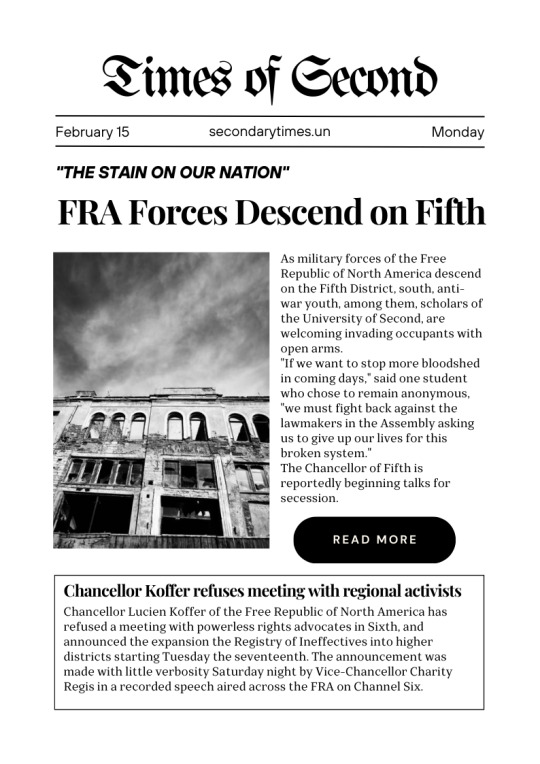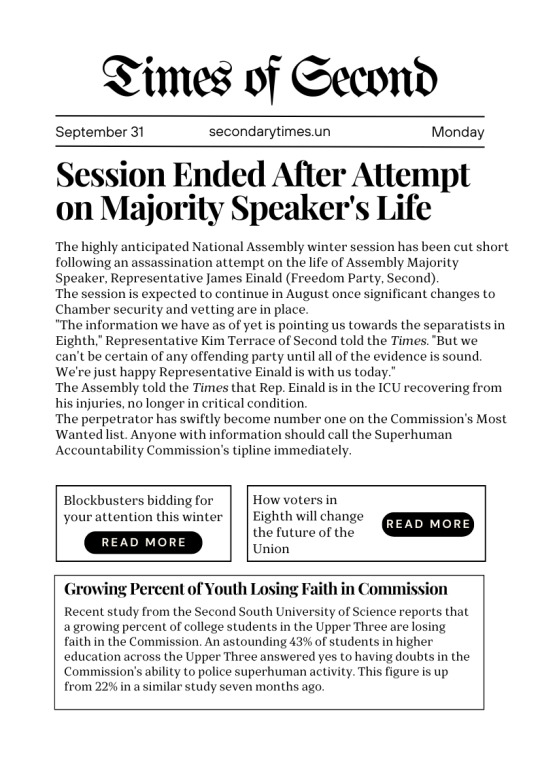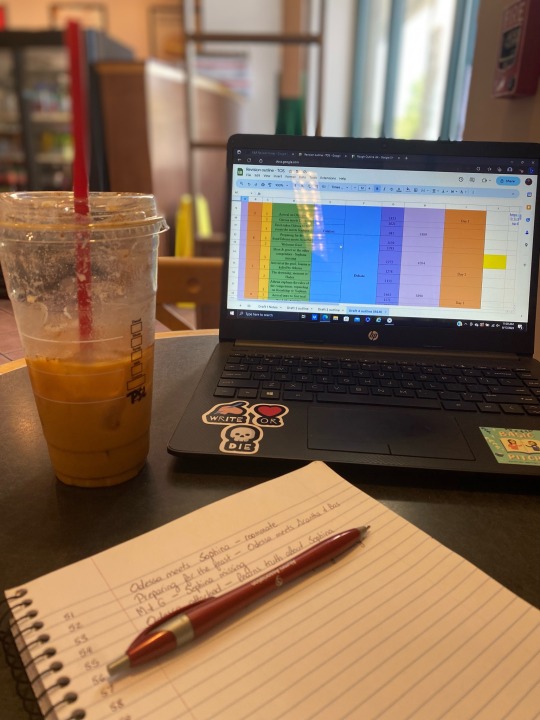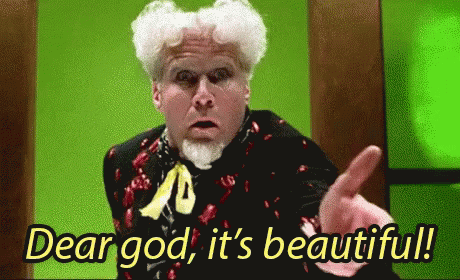#amquery
Text
I'm not saying I'm gonna print this rejection letter and frame it for when I'm feeling down about my writing, but "I loved it, it's really strong and entertaining, I have literally nothing bad to say about it and am only passing because I don't personally know the right editor for it and want it to be picked up sooner rather than later, and fully believe it will be" is pretty good for Baby's First Full Request.
Querying sucks and never ends but gosh darn it some days you feel like it might just be possible to make it through, and I'm holding onto that.
Gonna file it alongside the 18-hour beta binge read, the "I'm actually crying rn" text, and the "I was supposed to be sleeping but I couldn't not finish it so if I fall asleep at work later today I'm blaming you" message that also keep me going when I want to launch myself into a dumpster and scream.
33 notes
·
View notes
Text

True story. I'm going to do the agent hunt thing again once the #WGAStrike is over. I had to fire mine of 3 years. She sat on my ON DEPLOYMENT erotic novel for 3 years without submitting it to any publishing house. 3 emails and 2 phone calls in all that time. NOPE! I fired her and canceled my own contract. I mean, really? If you're going to take 15% + off the top of my earnings, you need to do your job.
#writing#writers#writers on tumblr#writing community#writerscommunity#writer things#novel writing#writerslife#writers and readers#writing tips#agents#amquerying#writer memes#writing humor#writing problems#writing memes#writer problems#writer stuff
25 notes
·
View notes
Text
My querying journey so far...
So many of you know that in between writing ridiculously long fanfics about Good Omens and the ineffible husbands, I write novels in the real world. And then try to sell them. I have not succeeded so far at the selling them part, but I'm shopping my third manuscript around right now and it's exciting to see how much better I think I'm getting at crafting a novel through the process of working very, very hard on this for the last three years.
At the start of this, when I was shopping around the novel I made from one of my fanfics, I used to post a lot about querying and how it was going, but I haven't in ages. Thought I'd share a little bit about that today.
Novel #1 - Adult Fantasy Romance, written in 2021
Status: shelved
Queries sent: 43
Requests received to read the full manuscript: 1
Rejections: 39
Percent requests: 2%
Things learned: worked great as an AO3 fic, but I can understand what it was lacking, in retrospect, when I tried to novelize it. I'd like to rewrite it someday. There are not very many agents looking for fantasy in any genre, so that's a little limiting.
Novel #2 - YA Contemporary, written in 2021-2022
Status: on hold, needs some rewrites in act two
Queries sent: 136
Requests: 11
Rejections: 125
Percent requests: 8%
Things learned: I got much better at pitching and querying in this, and my story was also a lot better. At the *very* end of the querying process, on my 11th full, I got some great feedback on what wasn't working in the middle of the book (which I'd gotten that sooner) and because I'm not sure what to do with this yet and was already writing another book by the time I got it, it's on hold. But I loved this story and I will return to it.
Interestingly, I won a pitch contest on this book and placed second with it in an unpublished novel contest. But it did not get picked up.
Novel #3 - YA Contemporary, written in 2022-23
Status: actively querying since summer.
Queries sent (so far): 71
Requests (so far): 10!!!
Rejections: 30
Percent requests: 14.1%
Things learned: trending up on all fronts! I've gotten more requests in the first three months than I did in almost a year on novel #2, and feedback so far even on rejections has been really positive. I feel like I was much more in control of my narrative on this manuscript, and I have a really good feeling that one of the fulls that are out right now is going to lead to something. Fingers crossed!
So... querying is a long, hard process. Most writers don't get their first book published; most debut novels are someone's third or fourth book. But boy, do you learn a lot about the process along the way.
12 notes
·
View notes
Text
My genuine hope for my book is to make readers say "That was strange and off-putting. I want more!"
#the book didnt feel weird enough#im not kidding#i was like 'this doesnt make me feel weird enough'#but dont worry#i fixed jt#it's weird as hell now#my favorite character sings at fire#my other favorite character is a sword but i still love him#write#writing#amquerying#tradpub#author#writing things
39 notes
·
View notes
Text
Writing/Publishing Resources
I've had a few people lately ask for the writing/publishing resources and knowledge I've collected over the past ~2 years of working on getting published, so I thought I'd just collect them all in a post that I can link people. Here we go:
What are your options for publishing a book?
The main options you'll find discussed are traditional publishing and self publishing.
Traditional Publishing: Publishing a book through a publishing house, like Simon & Schuster or Macmillan. The majority of books you see in bookstores will be traditionally published. When you traditionally publish a book, you sell the rights for it to a publisher, who then takes care of the actual publishing process for you. There are a wide variety of publishers out there, some very large and some very small.
Pros: Traditional publishing generally (though not always) gets you a bigger paycheck and gets your book in front of more people. The publisher will also pay for editing, cover design, etc—with traditional publishing, you shouldn't be expected to pay for any publishing expenses.
Cons: You often have less control over the book. It can also be very hard to get a book traditionally published—there are a lot of authors trying to publish their books and a much smaller number of books actually getting published every year. Additionally, a lot of marginalized authors struggle to get their books traditionally published, because publishers will either refuse to consider them outright or will try to say "We'll only publish you if you make your main characters straight/cis/white/monogamous/able-bodied/etc".
Self Publishing: Publishing a book yourself. While some people claim that self published books never make it into bookstores, there are actually bookstores (mostly independent ones) that carry self-published books that meet certain requirements. With self publishing, you keep all of your rights and handle the publishing process yourself. Many people just self-publish ebooks, but it is also possible to self-publish hard copies.
Pros: You retain full creative control of the book. You can publish absolutely whatever you want without needing to convince a publisher to do it. This also means that you have full freedom to publish sequels, prequels, etc, which can be hard to get a traditional publisher to agree to unless your book sold unusually well.
Cons: You have to either handle all aspects of publishing yourself or pay people to do it for you. This includes editing, cover design, managing social media, managing pre-order campaigns, laying out the book file, and of course, actually publishing it. If you're doing it all yourself, it's a lot of work, and it may not all be work you enjoy or are skilled at. If you're paying people to do it, the costs add up fast, and can easily total in the thousands by the time you're done. It can also be harder to make money and to get readers, though there are self-published authors who have done a great job at that.
While some traditionally published authors look down on self-published authors, I'm of the opinion that neither way is inherently better or worse than the other. They're both perfectly valid options for publishing a book, and it really just comes down to what works better for you, personally.
I haven't researched self publishing or nonfiction trad publishing as much, so this is going to focus on fiction trad publishing. If anyone wants to reblog with self publishing or nonfiction trad publishing resources, please do!
One last thing I want to note: many (maybe most, though I'm not 100% sure) publishers won't consider publishing a book that's been previously self-published. Others may consider it, but only under very special circumstances. If you're considering self publishing a book and then later trying to get it trad published, just keep in mind that self publishing it first could make it significantly harder (though not impossible) to get it trad published later.
How do you traditionally publish a book?
A lot of people are under the impression that to publish a book, you just mail your manuscript off to a publisher and hope they respond. These days, the process is actually a bit different. The steps to traditionally publishing a book are, generally speaking:
Write a full book (called a manuscript, sometimes abbreviated MS) and edit it to make sure it's as good as it can possibly be. Ideally, you'll also get feedback from other people on your manuscript before you send it out to make sure it's super solid
Submit your story to literary agents. The exact process for this differs by agent: some agents have you submit via a form on their website, others through a form on a website called Query Manager, and others through email. Exactly what you send will also vary by agent, but basically every agent will ask for a query letter, which you can think of as being sort of like a cover letter for your book. If an agent asks that you submit any part of your manuscript, it will generally just be a small part (e.g. first chapter, first 20 pages) rather than the entire manuscript
If any agents are interested in seeing more of your manuscript, they'll get back to you and request either a full manuscript (you send them the whole thing) or a partial manuscript (you send them part of it)
If an agent who requested to see more of your manuscript thinks that your story has publishing potential and they're interested in helping you publish it, they'll offer to represent your manuscript. Generally, you have a phone call with them at this point to go over all of the details, then wait 1-2 weeks to give them a response so you can reach out to any other agents you have active queries with and say "Hey, I just got an offer of representation, if you're interested in making your own offer, please respond by X date"
Once you have your agent, your agent may help you edit your book further or they may think it's fine as is. Once you're both happy with the book, you'll go on submission, meaning that the agent is going to reach out to editors at different publishing houses and say "Hey, I've got this book, do you wanna publish it?"
Ideally, at least one editor will make an offer, and if you agree with the terms they're offering, that's it—you're gonna be published! However, it is possible that no editors will make an offer, at which point you'll have to discuss with your agent if you want to keep trying with this book, try again with another book, or stop entirely
I will caution you now that it's very hard to get a book traditionally published. Recent surveys I've seen have put average rates of agents requesting fulls around 3-7%, depending on age range and genre. And that's not even rates for offering representation—that's just for saying "I want to read the full manuscript", which may or may not lead to an offer of rep (when I was querying SISTER OF THE SUN, three agents requested fulls, and none of them ended up offering rep).
It is also possible that you'll get an agent and get an offer to publish the book, but the offer will be conditional on terms that you don't want to agree with—I've known authors of color who got told "We'll only publish your book if you make the main character white", queer authors who got told "We'll only publish your book if you make the main character straight and cis", etc. They may also have terms that aren't necessarily bigoted but that you still don't want to agree to, like "We'll only publish your book if you remove the heist subplot" or "We'll only publish your book if you can cut 20,000 words from the manuscript".
None of this is intended to be discouraging or to say "nobody should try to get traditionally published"—I'm trying to get traditionally published right now!—but just to set expectations. Getting trad published is hard, and it takes most people a few tries before they can get a book published. Not being able to publish the first (or second, or third, or) book that you write doesn't necessarily mean you're a horrible writer who should just give up. Sometimes it takes a few tries.
I also want to be clear that, despite the warning I gave two paragraphs ago, there are marginalized authors who have successfully trad published a book without making those sacrifices. While it can be hard, it is possible, especially if you have an agent who will really champion your book.
Age Ranges
At some point before you attempt to publish your novel, you'll need to decide what age range is it. Many agents only represent certain age ranges, and will reject you immediately if you query a book in an age range they don't represent (e.g. if they only represent adult books and you try to query a middle grade novel, they'll probably auto reject you). The common age ranges are:
Board Book: A short book made of thick, durable cardboard; examples include Goodnight Moon and Brown Bear, Brown Bear, What Do You See?; typical reader age range is around 0-3
Picture Books: Slightly longer than board books and often printed on regular paper, but still contain illustrations on all or most pages; examples include Pete the Cat and Dr. Seuss’ books; typical reader age range is around 3-6
Chapter Books: Books that are longer than picture books and sorted into chapters, but still short and intended for young readers; examples include Junie B. Jones and Magic Tree House; typical reader age range is around 6-9
Middle Grade: Longer and more complex books intended for pre-teens; examples include Percy Jackson and Coraline; typical reader age range is around 9-13
Young Adult: Books intended for teenagers, fairly similar to adult but generally have a teenage protagonist and less mature themes; examples include The Hunger Games and To All the Boys I’ve Loved Before; typical reader age range is around 13-16
Adult: Books intended for adults; examples include This is How You Lose the Time War and The Song of Achilles; typical reader age range is around 16+
There’s also a proposed category called New Adult (NA), intended for readers around the 18-24 age range and focusing on characters around the same age. Unfortunately, the publishing industry has largely not responded to attempts to get this to be widespread, and it’s still a pretty niche concept. That isn’t to say that stories don’t get published that do, arguably, fit the definition of New Adult (personally, I think that both The Locked Tomb series and The Magicians could be viewed as NA), but the authors generally have to bill them as either YA or adult. If you’re writing a book that fits the bill for NA, you’ll probably have better luck querying it if you can reasonably describe it as either YA or adult.
Final note: you may see some discussion of kidlit. This is short for "children's literature" and refers to all of the categories except adult (an author who writes exclusively YA and an author who writes exclusively picture books are both considered kidlit writers).
Publishing Resources
Finally, here are a bunch of publishing resources I've accrued over the past two years!
Writing
On Writing Emotion
Capturing Voice!
How Long Should a Book Be? (Note: Please read this; it may seem like an inconsequential thing, but having a book that's significantly longer or shorter than genre standards can actually tank your chances of getting published)
Editing & Polishing
Tightening Prose
When Should I Spell Out Numbers? | Grammarly
Final Editing Checklist
Querying
Querying (1): Step by Step Query Process
Perfect Pitch
Query Letter Length: How Long Should Your Query Letter Be?
Advice for querying authors (Twitter thread)
questions to ask an agent on The Call
The Query Simplified
Pitch Wars: The Synopsis … simplified
How to Write a Synopsis without Stressing (Video)
Jumping Back Into the Trenches (or, querying again after splitting from your agent)
Nudging Agents with an Offer of Representation
Publishing & Marketing
Book Graphics Recs
So, you got an edit letter
Book Launch Survival Guide
Resource Collections
(Other collections of links to various resources around the web)
Be Your Own Mentor
Kidlit resources (Twitter thread)
Writing Resources (collected by Rebecca F. Kuang, author of The Poppy War)
Resources for writers that everyone assumes you already know (Twitter thread)
Resources & Diverse Recs
31 notes
·
View notes
Text

✅ DO
Address the literary agent name by name. Personalization is important for queries. You're trying to stand out among thousands of query emails. You have to make yourself memorable. Mention why you're querying a particular agent. Maybe they represent one of your favorite writers—mention that!
✅ DO
Research the literary agent. The more you know about them and what they represent, the better you will be able to gauge if they are the right agent to represent your story. Don't just query anyone! Be sure they represent your genre. Be sure they are still seeking those types of books. A quick Google search will go a long way!
❌ DON'T
Avoid saying that your book is the nest bestseller, or that you're the next Stephen King or J.K. Rowling. Doing this is your one-way ticket to an agent closing your email and moving on. Be formal. Be professional. Don't brag about yourself or your story. Even in your bio, remain humble.
❌ DON'T
Email the literary agent insults or "that they've made a mistake" if you receive a rejection letter. This will get you on a list that will lead to you receiving rejections from every agent within the publishing industry. The book community talks. We love tea (all kinds). You will be put on a "do not represent" list and never be considered after you've crossed this line.
Hope this is helpful to those writers who are in the query trenches! 🤎
#query#query letter#query trenches#query tips#amquerying#author#writer#amwriting#booknerdigans#writing#writerslife#writingcommunity#booknerd#novelist#novel#novel writing#fiction#authors#women writers#writings#writerblr#writerscorner#writing advice#writing blog#writers on tumblr#writer warnings
47 notes
·
View notes
Text
Yes I want to publish Incentive (Unknown) as a real book
And that is not a crime!!

Anyway, I'm very excited about my rewrite :)
I've decided in lieu of the headlines I put in chapter 26 of the original, I'm making fake news articles to go on the pages of the real book, because reading 600 headlines is BORINGGGG.
Here's one of my mockups :D! Mirage is now Lucien Koffer and Hysteria is Charity Regis, a loveable girlboss whom I adore with my whole heart.
And it somehow gets darker than the original Incentive. You'll see...

I hope you guys'll like it when it's finally done and hopefully has a publishing deal! Incentive fans are hardcore I know y'all would follow Mirage to the ends of the earth LMAO
#dsmp fanfic#dsmp wilbur#dsmp fic#dsmp fanart#wilbur soot#incentive unknown#incentive (unknown)#writerscommunity#writers on tumblr#authors of tumblr#author#am revising#amquerying#anonperegrine
7 notes
·
View notes
Text
la di da di da
going through query tracker and looking at the timelines of all the agents I have queries out with, a morning walk through future 'no,' the weirdest para-social relationships in the world.
Oh, A is doing a good job catching up on her backlog. She's only 84 days behind now. You go, A. I'm rooting for you to clear out your inbox!
I see myself in your maybe pile, B and I'm so curious about how you work. Is an intern sorting out the first pass, or do you make multiple passes yourself? The organization nerd in me wants to know!
C, honey. Why were you working on a Saturday? Take a break!
14 notes
·
View notes
Text

you better know i’m only following drew starkey content on this platform atm as i work on the ghosthunter enemies to lovers fantasy romcom that has me AMPED
#drew starkey#romcom#writers on tumblr#romance books#romance writing#writercommunity#amquerying#current wip#fantasy#romantasy#writers of color#latinx
9 notes
·
View notes
Text
First rejection for my querying, and it's short but slightly personalized.
#elumish writes#amquerying#i won't mention every time this happens but the first one felt noteworthy
31 notes
·
View notes
Text
I am obviously doing my own research, but if anyone has specific recommendations for lit agents who will be open in or around fall 2023 & taking/looking for adult contemporary crime fiction and/or thriller and/or psychological fiction, I'm all ears!
5 notes
·
View notes
Text
Revision work this morning! I finally finished my scene list and I’m ready to get started on my opening chapters once I write my new synopsis and query letter 😌

#writer#amwriting#writing#write#amquerying#writersoftumblr#writingcommunity#literary agent#writerproblems#amrevising
2 notes
·
View notes
Text
WGA Strike Ends
Guess what I'll be up to this week? #amquerying
#writing#writers#writers on tumblr#writing community#writers and readers#writerscommunity#writer things#writerslife#novel writing#writing tips#amquerying
8 notes
·
View notes
Text
THE STAGES OF A BOOK
.
FIRST DRAFT:

.
READING FOR EDITS:

.
WHAT THE FIRST DRAFT REALLY LOOKS LIKE:

.
EDITING PROCESS 1ST MONTH:

.
EDITING PROCESS 8TH MONTH:

.
SECOND DRAFT:

.
WHAT THE SECOND DRAFT REALLY LOOKS LIKE:

9 notes
·
View notes
Text
Next time you think you're overwriting just keep in mind that I added 40,000 words to my manuscript on a rewrite meant to SHORTEN IT
#writing#writeblr#author#writer things#amquerying#publishing#writerscommunity#its at 120k words right now#i love every single word#they are#they are my babies
8 notes
·
View notes
Text
No clue what I’m doing. But hello, I am here! I’m querying a YA fantasy about dragons, got like 5000 chronic illnesses, almost done with my master’s in public health, doin a thesis studying covid, read a fair amount, do the art-y things, and have two bunnies (duchess and merlin), a bearded dragon (pyro), and two kittens (Penelope and Theodore)
so this’ll probably be an unholy conglomeration of disability stuff, writing stuff, bookish stuff, virology and public health stuff, sub-par art, and my animals
#kittens#knitblr#manuscript#rabbit#bearded dragon#ya fantasy#amquerying#hello tumblr#dragon oc#chronic illness
13 notes
·
View notes